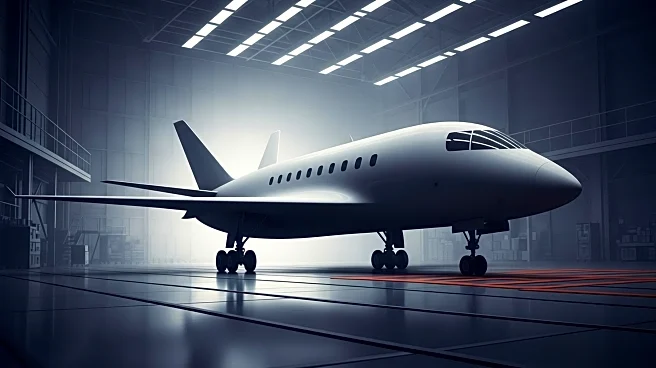What's Happening?
Riyadh Air, a new Saudi Arabian airline, has announced that its first Boeing 787-9 aircraft has completed assembly at Boeing's facility in Charleston. The aircraft, which will soon be painted in Riyadh Air's signature lavender livery, marks a significant milestone for the airline as it prepares to launch operations. Riyadh Air plans to operate a fleet of both Airbus and Boeing aircraft, with firm orders for 39 Boeing 787-9 Dreamliners and options for an additional 33. The airline aims to begin revenue flights later this year, following the acquisition of its air operator's certificate. The 787-9 will feature a four-class cabin design, accommodating 290 passengers across Business Elite, business class, premium economy, and economy sections.
Why It's Important?
The introduction of Riyadh Air's first Boeing 787-9 is a crucial step in the airline's strategy to establish itself as a major player in the global aviation market. With plans to serve over 100 destinations by 2030, Riyadh Air's expansion could significantly impact the competitive landscape of international air travel, particularly in the Middle East. The airline's investment in a diverse fleet of widebody and narrowbody jets positions it to capture a broad market segment, potentially increasing competition for established carriers. This development also underscores the growing influence of the Saudi Arabian Public Investment Fund in the aviation sector, as it seeks to diversify the nation's economy.
What's Next?
Riyadh Air is expected to continue expanding its fleet, with additional aircraft deliveries anticipated in the coming years. The airline's focus on a mix of Airbus and Boeing jets suggests a strategic approach to fleet management, allowing for flexibility in route planning and capacity management. As Riyadh Air moves closer to launching its inaugural flights, industry observers will be watching for further announcements regarding route networks, partnerships, and service offerings. The airline's success could prompt responses from competitors, potentially leading to shifts in pricing, service levels, and market strategies.
Beyond the Headlines
Riyadh Air's emergence highlights the broader trend of state-backed airlines in the Middle East seeking to leverage their financial resources to gain a foothold in the global aviation market. This development raises questions about the sustainability of such models in the face of fluctuating oil prices and economic uncertainties. Additionally, the airline's ambitious growth plans may have implications for environmental sustainability, as increased air travel contributes to carbon emissions. The industry will need to balance growth with efforts to reduce its environmental impact, potentially driving innovation in fuel efficiency and alternative energy sources.









